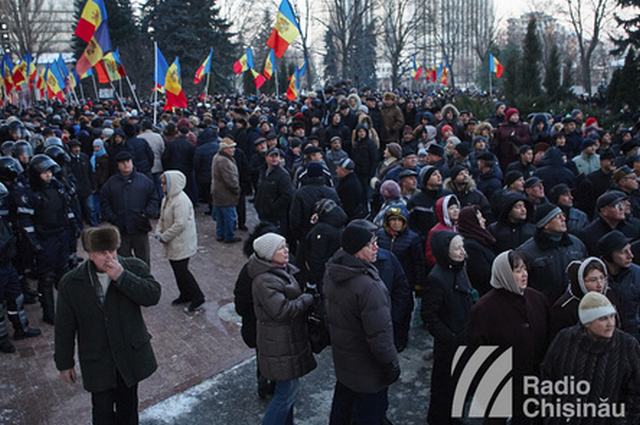Talks and protests in Chisinau
Protests continue in Chisinau against the new Government.

Bogdan Matei, 25.01.2016, 13:56
Sworn in last week in a secretive ceremony, the new Government led by Pavel Filip has already been driven into a corner. Voted by a conjectural and heterogeneous Parliament majority made up of pro-European Liberals, up to former communists turned Democrats, the Cabinet is seen as representative of a deeply corrupt political class.
Thousands of people took to the streets in Chisinau to protest against the Filip Cabinet, whom they accuse of having appropriated 1 billion dollars from the Moldovan banking system last year. Protesters called for the resignation of the governing coalition by Thursday afternoon and want the authorities to hold snap elections as late as April.
They warned that unless the Government meets their demands, they will block off traffic across the country and move to civil unrest actions. At Government level, the series of protests is seen as an irresponsible attempt of disrupting the stability of Moldova, while the protest itself is a mix of apparently contrasting ideologies. Protest ringleaders have either pro-Russian affiliation, supporting the Socialist or the Populist parties, or pro-Western, representing the grassroots citizen’s movement Dignity and Truth, a cartel of NGOs backing Moldova’s European integration. While Socialist leader Igor Dodon and Populist leader Renato Usatii like to make public appearances alongside Russian President Vladimir Putin, there are many voices inside Dignity and Truth who support the re-unification of Moldova and Romania.
Western powers believe however that, in the event of early elections, the pro-Russian left will come to power, thus sidetracking Moldova’s European integration efforts. This is the very reason, political pundits argue, why most Western countries chose to express their support for the Filip Cabinet, one with a shady credibility. The Prime Minister has already announced his first visit to Bucharest on Tuesday, when he is due to meet his counterpart Dacian Ciolos.
Talks are expected to focus, among others, on Romania’s loan to Moldova. Last year Romania offered to give a 150-million-euro loan to Moldova offset to balance the budget deficit. Against the growing political instability however Klaus Iohannis put a freeze on the loan, doubtful of the European aspirations of the political class in Moldova. On Sunday, however, Romania’s President remained a trusted partner of Moldova, and that the common history and language contribute to strengthening the identity and solidarity of the two countries. In turn, Romanian Prime Minister Dacian Ciolos said Romania supports Moldova and the civic and European aspirations of its citizens.






























